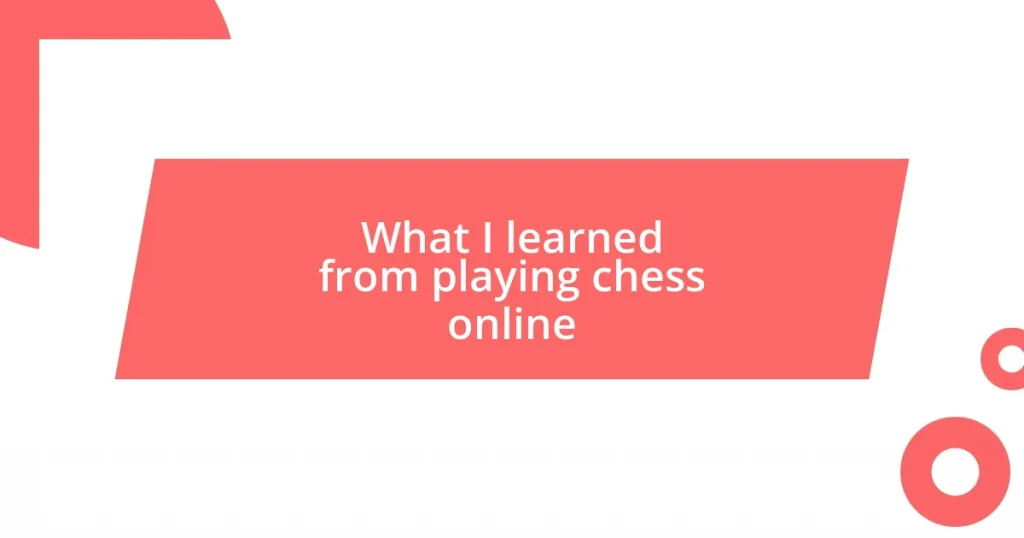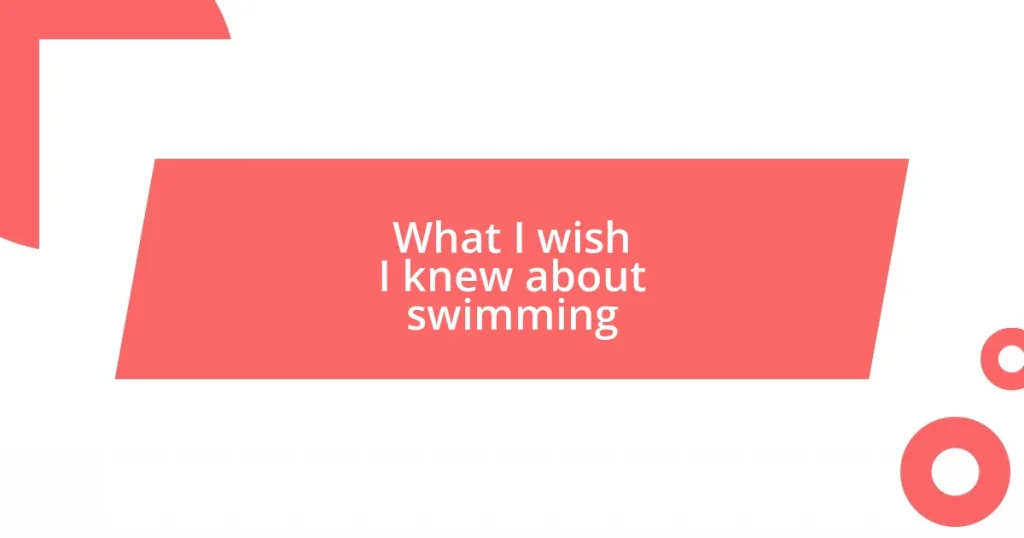Key takeaways:
- Online chess offers accessibility and a global player base, enriching the gaming experience and enabling constant skill improvement.
- Engaging with diverse opponents enhances strategic thinking and problem-solving skills, emphasizing the importance of planning, flexibility, and reflection.
- Learning patience and discipline through chess fosters better decision-making and focus, transforming insights into everyday life challenges.
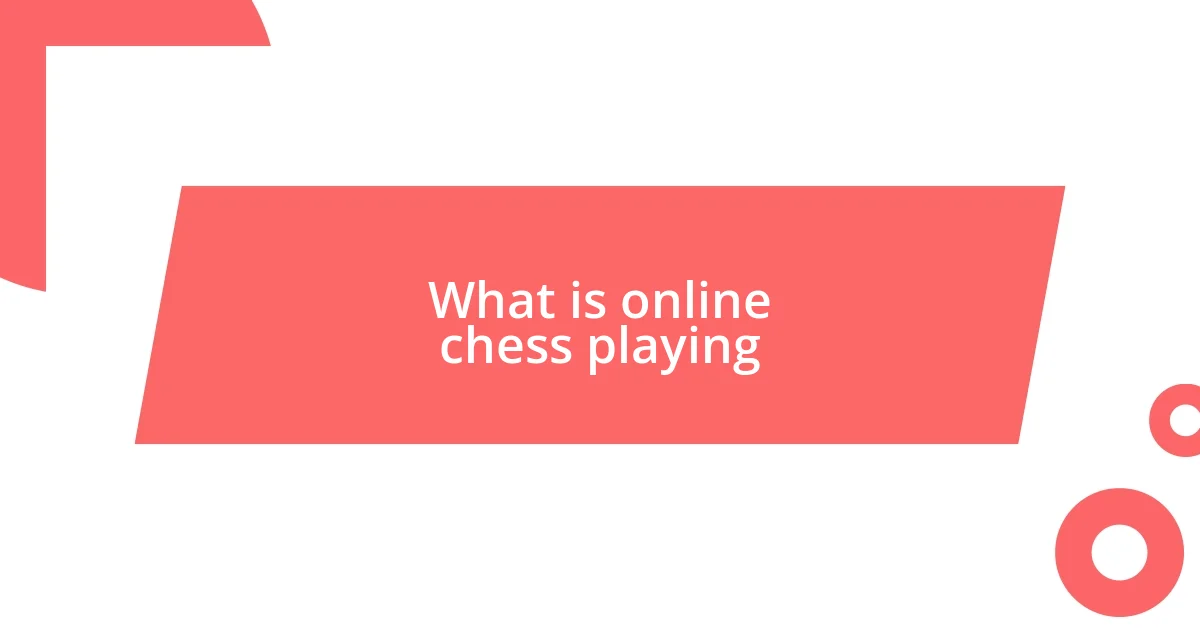
What is online chess playing
Online chess playing has transformed the way enthusiasts like myself engage with this timeless game. I vividly remember the thrill of logging into a platform for the first time, excited yet a bit nervous. It was like stepping onto a global stage, where every match brought the opportunity to face opponents from different backgrounds, all united by a shared passion for chess.
What’s fascinating is how online chess is accessible anytime, anywhere. I often find myself squeezing in a game during lunch breaks or late at night when the house is quiet. Have you ever experienced the rush of playing a quick match and having your strategies tested in real time? It’s exhilarating to see your skills improve with each game, making it feel less like just playing a board game and more like a personal journey of growth.
Moreover, the variety of formats and time controls available online adds layers of excitement. From blitz games that leave your heart racing to classical matches that allow deeper thought and analysis, every type of game has its charm. I still recall one particularly memorable blitz match where I had only seconds left on the clock, yet managed to pull off a last-minute checkmate. That thrill stays with you—it’s moments like these that keep me coming back to the virtual chessboard.
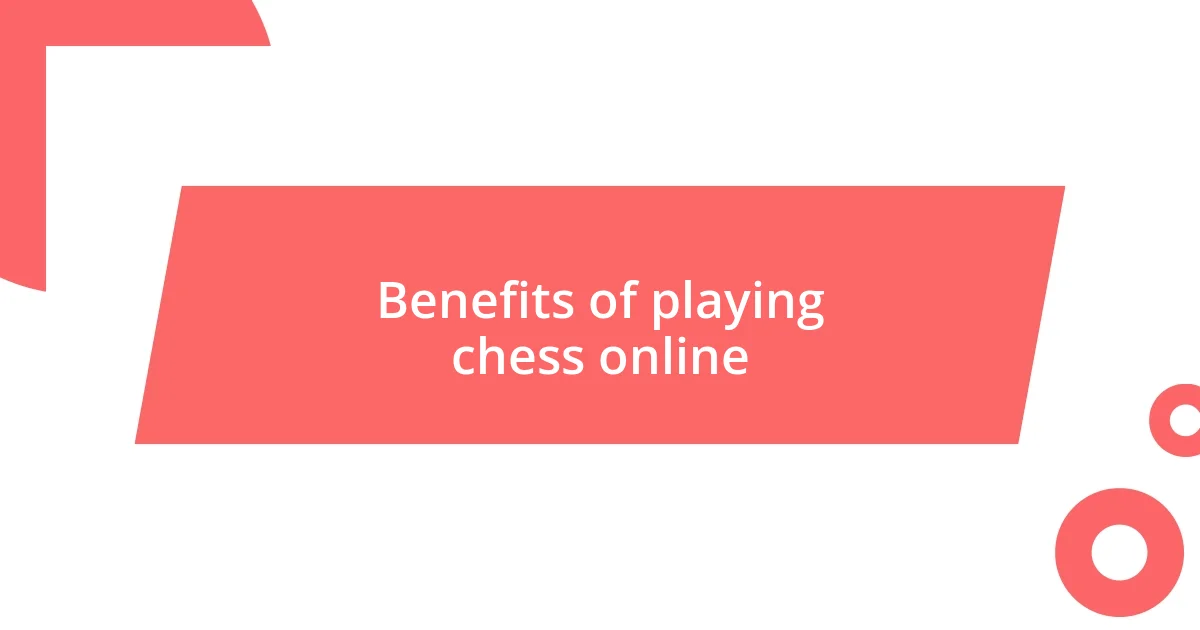
Benefits of playing chess online
Playing chess online offers numerous benefits that I’ve come to appreciate personally. One of the standout advantages is the accessibility; no longer do you have to wait for a weekend or gather friends for a match. I love how I can hop onto a chess platform any time of day. Just last week, I took a break from a busy workday and found myself facing an opponent from another country. The thrill of competing against a diverse range of players really enhances your ability to adapt and think on your feet.
In addition, the online chess community is incredibly engaging. I often participate in forums and chat rooms where players share strategies and celebrate victories together. Here are some benefits I’ve experienced:
- Access to a Global Player Base: Meet opponents from around the world, enriching your understanding of different playing styles.
- Variety of Game Formats: Choose from blitz, rapid, and classical games tailored to your available time and skill level.
- Instant Feedback: Analyze your games with built-in tools that help identify strengths and weaknesses, accelerating your learning process.
- Flexible Scheduling: Play whenever it suits you, making it easier to fit chess into a busy lifestyle.
- Community Support: Engage with a passionate community that shares tips, resources, and encouragement, making the game feel more inclusive and fun.
For me, it’s really about the constant opportunities for interaction and improvement that make online chess so appealing. There’s something rewarding about reflecting on your games and connecting with fellow enthusiasts who inspire you to keep growing.
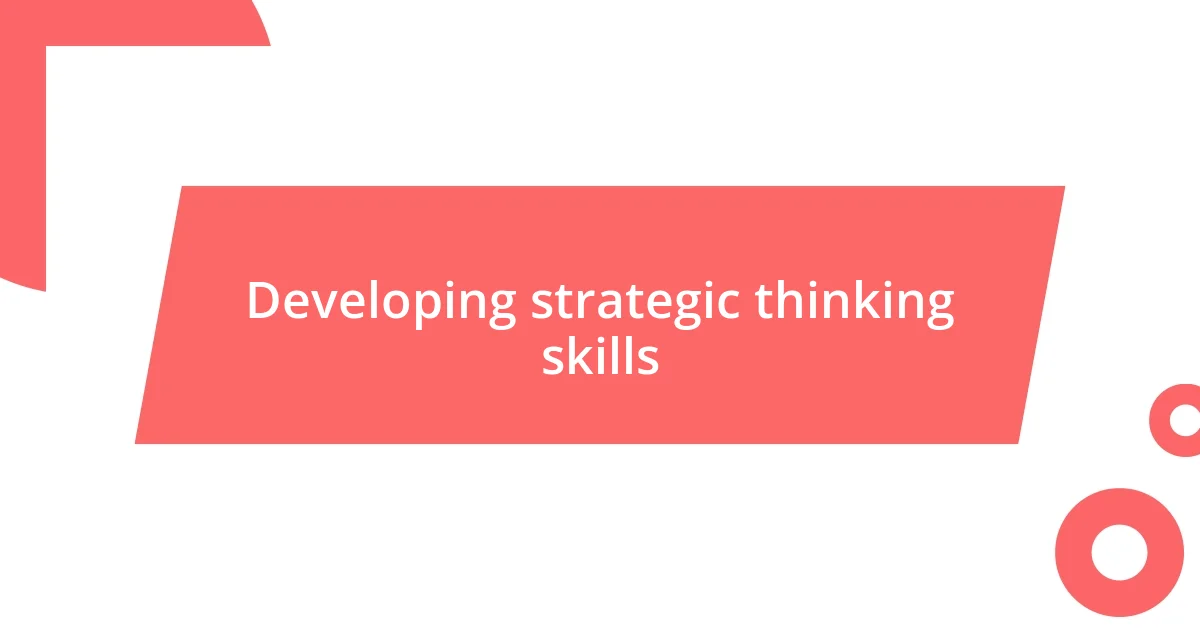
Developing strategic thinking skills
Developing strategic thinking skills through online chess has been one of the most exciting aspects of my journey. I remember a particular moment when I was facing an opponent who played an unorthodox opening. At first, I felt thrown off, but instead of panicking, I took a breath and started evaluating my options more carefully. This situation made me realize that every game is a puzzle waiting to be solved, and the ability to strategize in real time is crucial, especially when confronted with the unexpected.
In fact, the variety of opponents I encountered online pushed me to think several moves ahead. I discovered early on that just reacting to my opponent’s moves wasn’t enough. I needed to anticipate their strategy while also crafting my own. That kind of foresight is essential, and I often found myself analyzing past games to see where I could improve. Reflecting on those moments not only sharpened my tactics but also instilled a sense of patience and foresight that I now apply in other areas of my life as well.
When I think about my development as a strategic thinker, the importance of planning and flexibility comes to mind. It’s akin to navigating a winding road where you must constantly adjust your approach. I recall a game where I was down in material but managed to create a series of threats that turned the tide in my favor. That experience underscored the value of remaining adaptable and ensuring that each move contributes to a larger game plan. It’s moments like these that reinforce my belief in the transformative power of chess to cultivate critical thinking skills.
| Aspects | Online Chess |
|---|---|
| Strategic Application | Real-time decision-making |
| Anticipation | Foreseeing opponent’s moves |
| Flexibility | Adjusting strategies mid-game |
| Reflection | Learning from past games |
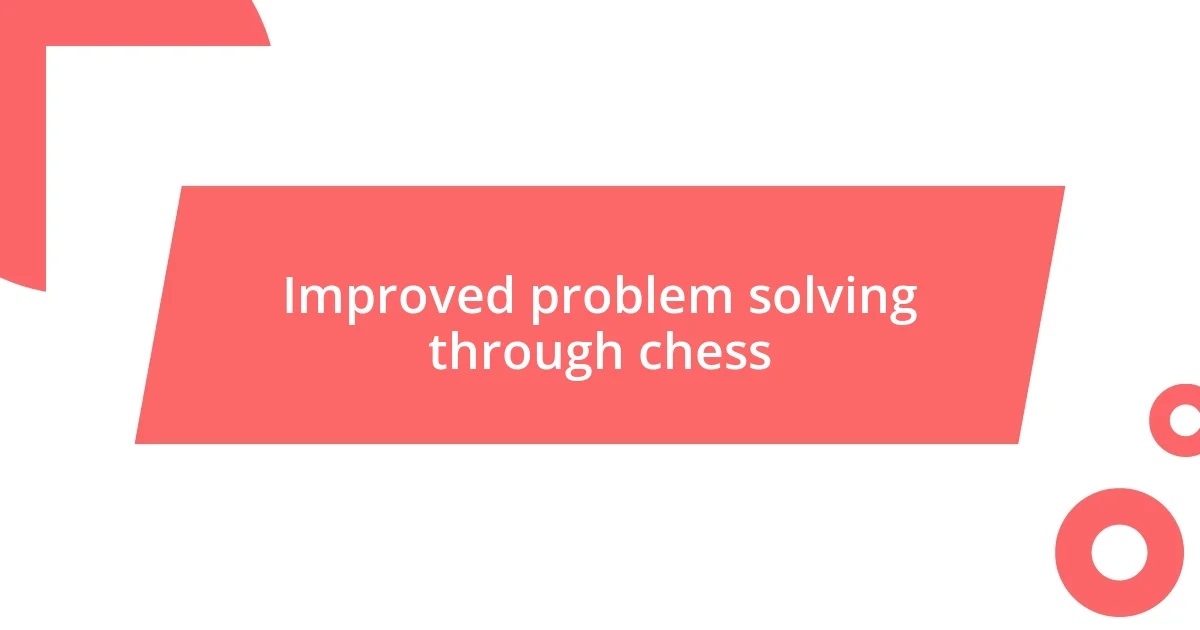
Improved problem solving through chess
Improving problem-solving skills through chess has become a fascinating journey for me. I vividly recall a tense moment in a recent match where I was faced with a tough opponent. My king was cornered, and panic threatened to take over, but instead, I asked myself, “What if I look for hidden opportunities?” This shift in mindset allowed me to spot a potential checkmate in the subsequent moves. It was exhilarating to realize that problem-solving in chess often involves looking beyond the obvious.
Each game presents a new set of challenges that demand creative solutions. I’ve faced situations where I felt completely outmatched. It’s in these moments that I’ve learned to embrace the discomfort of uncertainty. For instance, I once found myself down a rook in a game, but rather than resigning, I thought critically about my position and devised a strategy to sacrifice my remaining pieces for greater control. The game turned into a narrative of resilience, reminding me that sometimes the best answers come from stepping back and assessing the complexity of the problem at hand.
Chess teaches us that every decision has a ripple effect, much like life itself. One day, I lost a match simply because I failed to consider the potential responses to my moves. I remember feeling frustrated, but it was a powerful moment of clarity: every problem is layered, and sometimes you need to peel back those layers to find the solution. This experience reinforced my understanding that improving problem-solving skills isn’t just about winning; it’s about learning to navigate challenges with creativity and composure, both on and off the board.
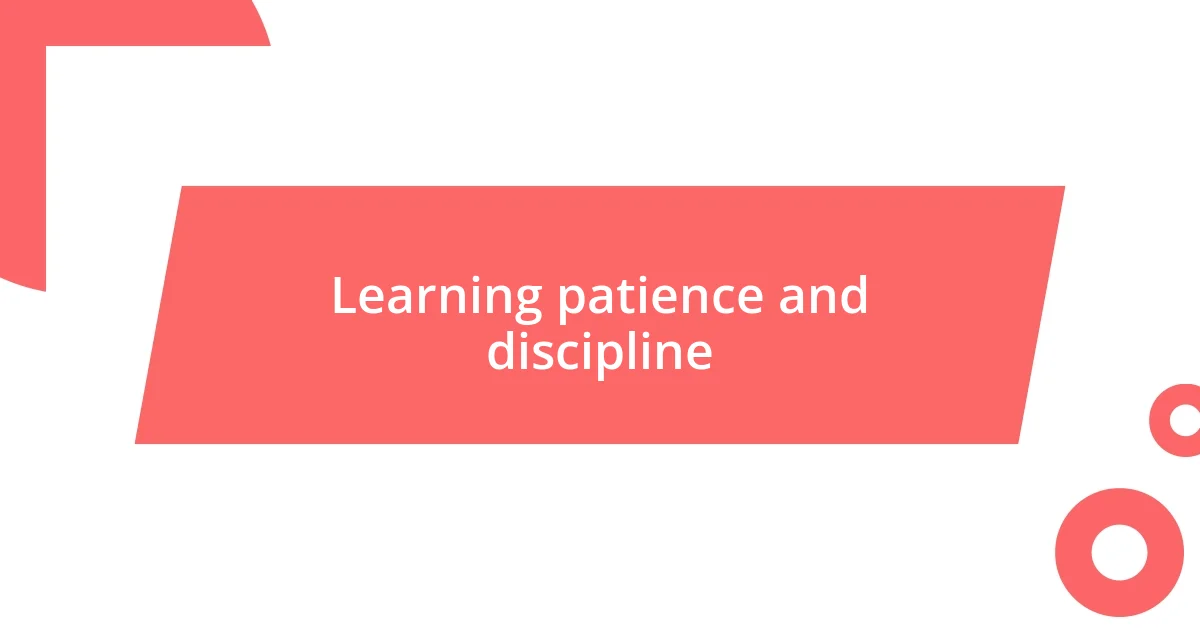
Learning patience and discipline
Learning patience and discipline in chess online has been eye-opening for me. I can’t count the times I’ve faced an opponent who would take their sweet time between moves. Initially, it would frustrate me. But as I observed their careful deliberation, I began to understand the beauty of patience; each second spent contemplating a move often led to stronger plays. It made me realize that impatience can cloud judgment, something that I’ve started applying in my everyday decision-making as well.
There was a particular game that stands out in my memory. I had a chance to close the game quickly, but I hesitated, feeling the pressure to act fast. Instead of rushing, I took a moment to assess the board and consider my opponent’s potential counter-moves. I can still remember the quiet atmosphere around me while I waited, fighting the urge to click “make move.” When I finally did act, I executed a strategy that not only secured my victory but also proved that sometimes waiting for the right moment can deliver much better outcomes. This experience cultivated a sense of discipline I hadn’t grasped before.
I often ask myself, “How patient am I in other areas of my life?” The challenge of maintaining focus while holding on to patience became evident during tense match situations. I discovered that it’s in the moments of silence and reflection where I find my calmest strategies. Whether it’s staying calm while calculating my next move or allowing the game to unfold, the practice has instilled a grounded mindset. I now approach challenges with a steadier hand, knowing that patience and discipline are my greatest allies both on and off the board.
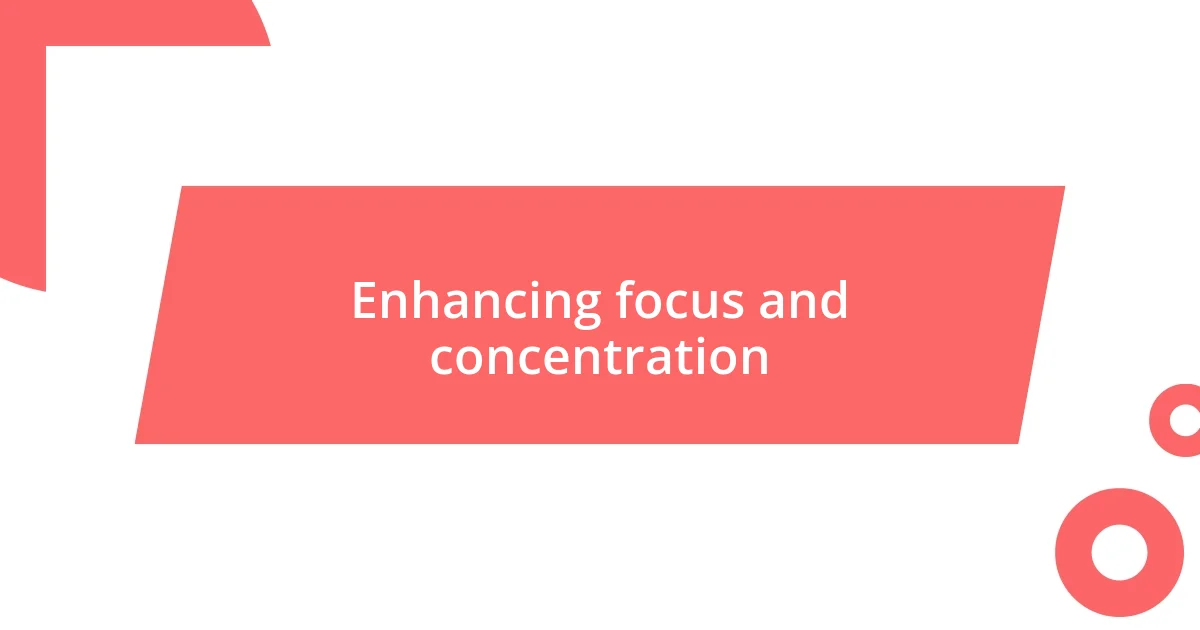
Enhancing focus and concentration
Playing chess online has significantly sharpened my ability to focus and concentrate, often in unexpected ways. I remember a time when I was deep in a tournament match. Each piece movement felt like a test, almost like a meditation that demanded my full attention. I found that as I prioritized my focus on the game, the outside world faded away, allowing me to zero in completely on the board. Have you ever experienced that moment where everything else just disappears, leaving only the task at hand? It’s a powerful reminder that heightened concentration can create a bridge to better performance.
One specific game stands out vividly in my memory. I was knee-deep in a battle against a skilled opponent, and distractions loomed large—my phone buzzing, the TV in the background, and my own racing thoughts. In those moments, I discovered that honing my focus meant blocking out those distractions, almost as if I were in an invisible bubble where only the chessboard existed. The deeper I delved, the more I realized that every choice demanded my undivided attention. After the match, I felt an incredible rush. It wasn’t just about winning; it was about how this intense focus positively affected my clarity of thought, not only in chess but also in my daily life.
The beauty of online chess is that it challenged me to maintain concentration over extended periods. There were matches that stretched into the late hours of the night. I learned that I needed to pace myself, balancing intense focus with moments of rest. Have you ever caught yourself losing track of time while engaged in something you love? I certainly have. This practice of mastering focus has spilled over into other areas of my life, from studying to having meaningful conversations. By learning to concentrate effectively during my games, I’ve equipped myself with valuable skills that empower me to tackle challenges with renewed vigor every day.










